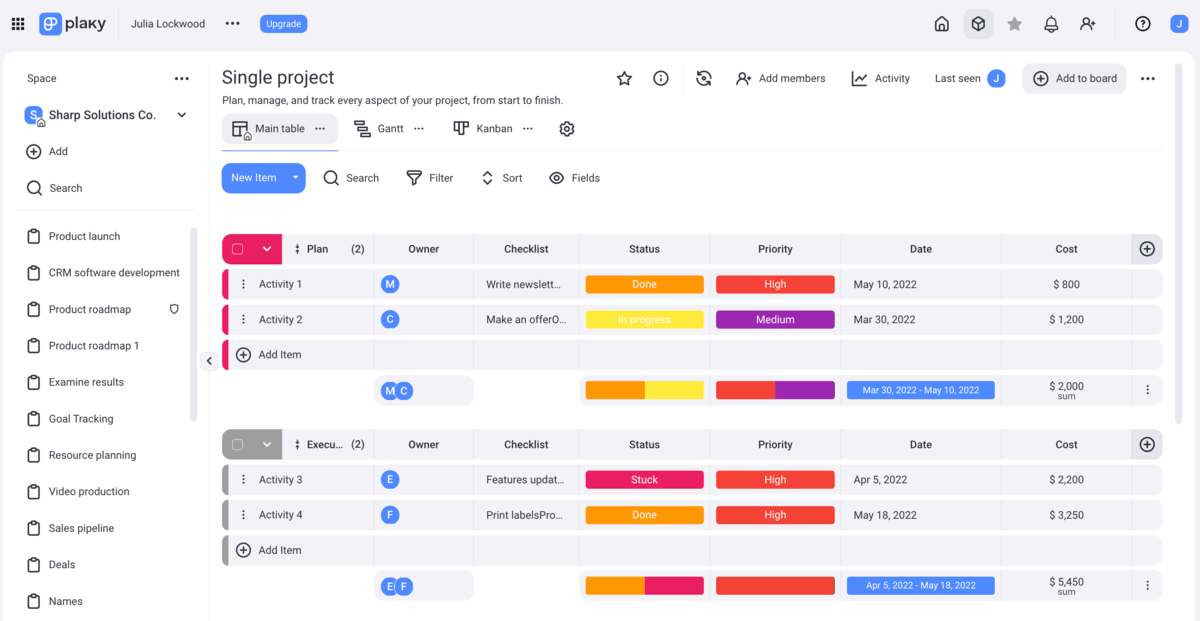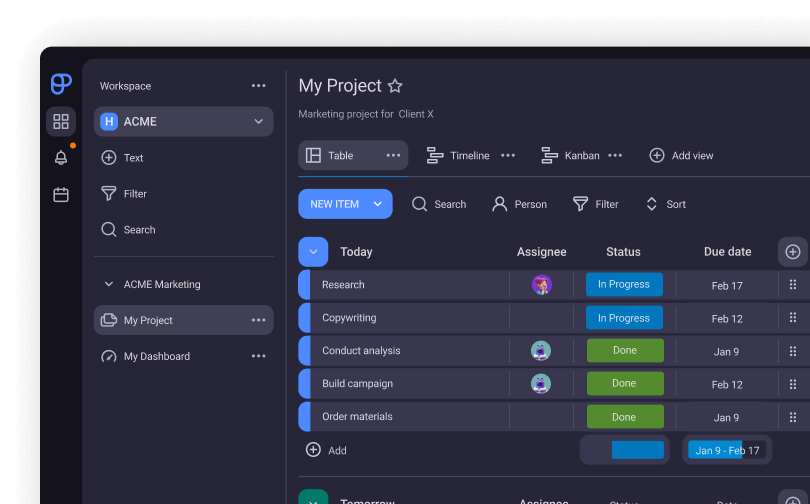Why Is Project Management Important for Your Business Success?
More and more companies are starting to recognize the potential of project management and understand the advantages of an organized project approach.
This is not surprising, given the fact that organizations undervaluing project management face a 50% project failure rate.
Project management is important because it helps create a streamlined system for managing projects in an efficient and rational way.
When done properly, project management reduces risks, cuts costs, and improves project success rate. It fosters better collaboration and holds all the elements of a project together.

- Saving time and money is the result of a firm project plan. By having a specified timeline and realistically allocated resources, chances are the project will stay within budget and time scope.
- Good project collaboration and communication are what leads the project. Not only do they enable the project progress, but they also help connect remote team members and keep them on the same page.
- Accountability is essential in project management. Regular status updates add to greater individual accountability.
- Project management encourages capturing lessons learned, and this way, it prevents repeating the same mistakes in future projects.
- Using project management software helps project managers keep track of project processes, and as a result, enables better risk management and quality control.
Table of Contents
The benefits of project management
So, why is project management that important?
Navigating projects without project managers’ expertise, you risk missing deadlines, going over budget, and experiencing the worst-case scenario — project failure.
With many project methodologies at their disposal, project managers can craft a great project plan, secure funding, and allocate resources — lay out a path toward success.
We reached out to Sergei Brovkin, a certified PMP with more than 20 years of experience in the field and organizational productivity and transformation expert, who attributed the growing popularity of project management to its adaptability to different business environments:

“It is worth noting that project management is gaining more attention these days. Specifically, this resurgence in the significance of project management is due to the rapid and dynamic nature of the business environment. This environment necessitates constant change and adaptation, essentially transforming numerous businesses into a series of one-off startups that succeed when overseen and managed as individual projects.”
So, to illustrate the importance of project management, it’s best we walk you through the 11 most prominent benefits of the field:
Benefit #1: It saves money and time
The PMI’s Pulse of the Profession report states that only 58% of organizations understand how valuable project management is for their work.
In addition, it is reported that 9.9% of every dollar is wasted as a result of poor project management. This means that $99 million dollars are lost for every $1 billion invested in projects.
Throwing money away is hardly a desirable outcome for businesses. Therefore, appointing a project manager is the right option. This way, you get a proper project plan, tasks are done in due time, and projects stay within budget.
Also, since the whole project progress is transparent, it is easier to spot potential bottlenecks, and, more importantly, allocate project resources appropriately. Consequently, you prevent delays and going over budget.
Speaking of time-saving, project managers determine the time necessary to complete tasks. They define a project schedule and specify the start and end date for all tasks. Careful monitoring allows project managers to make adjustments in case they notice any impediments on the way.
Benefit #2: It enables realistic project planning
If done properly, project management provides the entire team with a clear picture of who does what, how, and when.
Project managers define a project management plan, which serves as a guide to the team and other parties involved.
The plan contains information on all project elements such as project scope, timeline, and budget. It results from the project manager’s full understanding of the project, potential risks, and project requirements.
When they create project plans, project managers tend to negotiate and set achievable project deadlines and project milestones. Plus, they predict pitfalls, provide solutions to them, and keep the project on track.
Benefit #3: It facilitates remote work
Project management is indispensable for remote work since it finds ways to set up communication channels, allocate tasks, and manage remote workers no matter their time zone.
The importance of project management in remote work organizations is supported by Alexis Nicole White — a certified organizational transformational leader, PMP and SMC — who explains that key project management elements translate perfectly to a remote work environment and help it flourish:

“Key components of project management that help manage workers remotely are clear communication, goal alignment, accountability with task tracking, resource management, collaboration, documentation, with measurable performance metrics that can validate success.”
Nicole White also proposes ways to assess remote workers:

Project managers are able to build a remote work culture that helps teams stay connected and pursue the same goals.
💡 Plaky Pro Tip
If you’d like to use OKRs with your team, check out our free OKR templates below:
Benefit #4: It ensures accountability
Having a single leader with the necessary project management skills helps in many ways — but, most importantly, it establishes clear accountability.
Accountability is one of the power skills that help project managers handle projects from inception to completion and accomplish organizational objectives.
Although the entire project team should have a strong sense of accountability, the project manager is the one usually “held accountable” if the project goes off the rails or its quality is poor.
Accountability is based on regular progress tracking, and it helps project managers identify potential issues. Here is what Alexis Nicole White told us about the value of accountability:

“Established within most project management methodologies, accountability is presented by tracking the progress of a specific task assigned to a particular resource. Accountability is most helpful with remote workers as it monitors performance, identifies any potential impediments that can develop a bottleneck or hinder delivery altogether. It also keeps individuals on task since there are usually pre-determined check-ins and status updates.”
Therefore, to strengthen accountability, project managers should make sure all actions are transparent and everyone is on the same page knowing what to do and how. On the other hand, all team members should take ownership of their responsibilities in order to deliver better results.
Benefit #5: It improves resource management
One of the main concerns project managers have is the allocation of project resources. Resources are what project managers can count on when they start a project — materials, people, finances, and time.
The truth is, projects have many interlinked variables, and there are many factors that influence them. With project management, you can calculate a realistic quality output based on available resources to complete the project on time, on budget, and at the desired level of quality.
The triple-constraint theory of project management states that scope, cost, and time are intrinsically linked. Changing one necessitates a proportional change in the other two, or the overall quality of the project suffers.
In addition, project managers know what skills and level of expertise their team members have and where they can contribute best.
💡 Plaky Pro Tip
To learn more about the triple constraints, as well as go beyond them and find out about more constraints in project management, check out this guide:
Benefit #6: It enables better risk management
Projects rarely go to plan, and risk management often has a decisive role in project success.
As per KPMG’s report Five pillars of major project success, 53% of organizations have faced one or more failed projects. This figure goes up to 71% in companies dealing with natural resources.
Using proper project management — mandatory and adequate risk management included — greatly increases your chances of a positive project outcome.
There’s a large pool of risk categories that might impact projects such as cost risks, market risks, and schedule risks.
By using risk analysis, project managers know what to expect and how to handle most of the issues projects are expected to encounter. Also, by recognizing the direction from which risks can emerge, managers are able to prevent risks from becoming serious issues.
Sergei Brovkin explains the need for good project management when dealing with unexpected challenges:

“When a project deviates from the established plan or misses deadlines, a good project manager’s instincts for identifying potential issues early on, coupled with their detailed planning abilities, ensure that corrective actions can be taken promptly.”
According to the McKinsey report on risk management, 73% of managers recognize the strengthening of risk culture as the best action to improve resilience within their organizations.
An unexpected outbreak of a global pandemic or a sudden financial market crash can still throw projects into disarray — but these are the expectations, not the rule.
💡 Plaky Pro Tip
If you are interested in the reasons why projects fail, check out the following article:
Benefit #7: It encourages learning from mistakes
Project managers and their teams hold retrospective meetings upon project completion to reflect on project performance — both the positive and the negative.
Teams discuss what went well and what didn’t go so well to prevent repeating the same mistakes or build on the positives. The results they come up with are known as lessons learned.
Lessons learned should be captured and documented throughout the entire project lifecycle and this is something project managers should encourage from the start.
There are several ways to capture lessons learned, such as through post-project meetings, surveys, or one-on-one meetings. Project managers decide on the best option based on their team size, available time, and the preferences of team members.
Learning from mistakes enables continuous improvement of future projects and helps teams grow by capitalizing on good practices and avoiding known missteps.
Benefit #8: It improves collaboration and communication
Project managers need to encourage project collaboration by uniting their teams around mutual goals and objectives.
Projects are usually complex and carried out across different teams and departments. Without proper collaboration among them, streamlining project activities toward success is impossible.
Efficient project management keeps everyone on the same page by:
- Presenting a clear project plan,
- Establishing communication channels,
- Encouraging consistent and real-time feedback,
- Insisting on transparency and sharing of information, and
- Arranging regular meetings.
According to Sergei Brovkin, good communication is a trait of good project managers:

“[Good project managers] effortlessly facilitate communication by ensuring clarity in goals, sharing progress updates, and addressing concerns promptly. When engaging with stakeholders and clients, their natural ability to build relationships and maintain transparency leads to successful project outcomes.”
A communication plan is another project management point that Alexis Nicole White brings to our attention:

“Typically, a project manager will establish a communication plan to execute. It also helps individuals identify roles and responsibilities for each team member so that everyone is aware of who to speak to and when. When it comes to external clients, each stakeholder will expect an update, address their concerns, and reset expectations.”
On the whole, active project collaboration supported by open communication can boost teamwork and lay a solid foundation for project success.
Benefit #9: It helps minimize duplicate work
One of the pressing concerns of many organizations is work duplications.
The reasons behind the duplicate work problem are usually poor communication, information gaps, or simply unmonitored tasks.
Good project management provides a centralized system where all relevant data connected to a project should be kept. Also, project managers should make clear what channels of communication are available for sharing information between team members and departments involved in the project.
According to a Forbes article on workplace burnout, knowledge workers spend 58% of their workday on duplicated work, unnecessary meetings, and too many apps.
Not only does duplication negatively affect performance, but it also results in a needless waste of resources.
However, with clearly defined processes and better communication, chances are teams will have less duplicate work.
Benefit #10: It facilitates oversight and quality control
Quality control is capital in project management. All the effort is worthless if the final product doesn’t meet the expected quality standards.
Therefore, constant oversight and regular quality checks are another concern of project managers.
Alexis Nicole White highlights the importance of establishing success criteria for determining what is acceptable and what isn’t:

“When you define what the objectives are, you can establish clear quality standards. Then, define measurable metrics to assess performance against said standards. By regularly monitoring the progress and performance through various methods, such as inspections or audits, one can identify and address any issues promptly and implement corrective actions.”
Benefit #11: It streamlines work through project management software
Project management tools help project managers keep an eye on how tasks are carried out, and they allow for easy and complete oversight of the entire project.
What’s more, such tools can also more easily alert managers to impending risks and objective off-tracking.
According to the statistics on project management software, 69% of project managers use collaboration tools to administer their projects.
The PWC’s research on current project management practices has clearly shown there is a strong link between project management software usage and high project performance.
Project performance metrics in companies that use project management software tower over those of companies that don’t use any.
With project management software like Plaky, project managers can now effortlessly keep track of the project progress and make informed decisions that will steer the project toward success.

Plaky is a state-of-the-art project management tool supporting unlimited users and projects in its generous free plan. The platform offers project managers everything they need to reduce risks, cut costs, and improve success rates.
Conclusion: Project management is the moving force of project success
By this point, you should have a clear understanding of why project management is important for teams working on projects.
However, the main takeaway of this guide shouldn’t be that project management is beneficial — that much is expected.
Instead, it’s that project management is necessary for the optimal growth and development of any company.
Furthermore, if you’re still in doubt about whether to invest in project management software, you can try out Plaky.
📖 Interested in project management? Explore our Project Management Glossary of Terms and learn more about the importance of project management through our vast library of basic and advanced project management terminology.
References
- Andriole, S. (2020, December 1). Why No One Can Manage Projects, Especially Technology Projects. Forbes. https://www.forbes.com/sites/steveandriole/2020/12/01/why-no-one-can-manage-projects-especially-technology-projects/?sh=13766b782da2
- PMI (2018). Pulse of the Profession 2018: Success in Disruptive Times: Expanding the Value Delivery Landscape to Address the High Cost of Low Performance. Retrieved November 2, 2023, from https://www.pmi.org/-/media/pmi/documents/public/pdf/learning/thought-leadership/pulse/pulse-of-the-profession-2018.pdf
- PMI (2023). Pulse of the Profession 2023: Power Skills, Redefining Project Success, 14th Edition. Retrieved November 1, 2023, from https://www.pmi.org/-/media/pmi/documents/public/pdf/learning/thought-leadership/pmi-pulse-of-the-profession-2023-report.pdf?rev=427949fcdb684485a020cc72ea219f32&sc_lang_temp=en
- KPMG (2020, February). Five Pillars of Major Project Success, Retrieved November 1, 2023 from https://assets.kpmg.com/content/dam/kpmg/ca/pdf/2023/03/major-project-governance-en-web.pdf
- McKinsey & Company (2022, April). McKinsey on Risk – Institutional resilience starts with understanding risks, Number 12. Retrieved October 31, 2023 from https://www.mckinsey.com/~/media/mckinsey/business%20functions/risk/our%20insights/mckinsey%20on%20risk%20number%2012/mck_risk_12_full_issue_vf.pdf
- PwC. (n.d.). Insights and Trends: Current Programme and Project Management Practices; The second global survey on the current state of project management maturity in organizations across the world, PricewaterhouseCoopers, Retrieved November 3, 2023, from https://www.pwc.com/cl/es/publicaciones/assets/insighttrends.pdf
 Project Management Hub
Project Management Hub 








